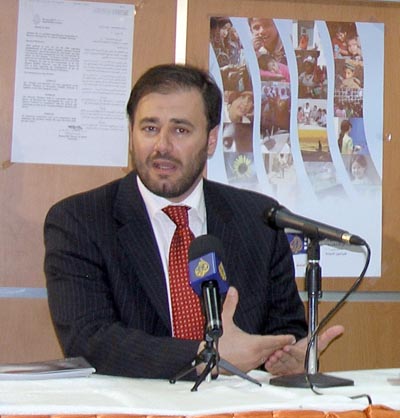How do we read coverage to date of the momentous events in Egypt?
To say that official Egyptian media have been in a time warp since the troubles began would be understating matters.
A sign carried by a demonstrator in Cairo's Tahrir Square read: "Egyptian media don't see, don't hear, they just talk."
It was right on the mark.
Watching state-run Nile TV, a viewer could easily be misled into thinking the upheaval was one-sided, simply a plot to undermine the Egyptian regime, and totally lacking in context.
At first it reported the outbreak of anti-government demonstrations as limited action by a few dozen protesters demanding social and economic changes.
It also referred to widespread popular rejection of the actions of "the few who claim to represent the Egyptian people."
As a result, Nile TV reporter Shahira Amin walked out when she refused to continue broadcasting the official lies and was hailed for her courage.
"The state media is a disgrace," said Laila, an Egyptian friend with whom I was chatting online despite spotty Internet service in Cairo.
She believed the army would settle the standoff with President Hosni Mubarak by Friday at the latest to end his 30-year hold on power.
Meanwhile, Arab and international media were tripping over themselves and each other to cover, and comment on, the unfolding story, whose end remains unclear while a tottering sclerotic regime desperately tried to hang on.
The visuals have been gripping: bloodied demonstrators, journalists scurrying about to report (and keep safe), pro-government secret police accused of attacking unarmed civilians adding fuel to the fire, and, an army observing from the sidelines at this writing.
It's the "war of the channels" wrote Malek Alqaaqour in the pan-Arab daily Al Hayat, criticizing unnamed Arab news outlets of unprofessional and unfair coverage.
Nevertheless, the Arab media's effort is "immense and deserves admiration, as the professional compass sometimes goes off-course during storms," he noted.
"Ya Arabiya, ya Arabiya, ma tkouni ma' el haramiyya," (Al Arabiya, don't side with the crooks), chanted journalists and activists in Beirut against the Dubai-based, Saudi-financed satellite channel, which they accused of cozying up to the regime of President Hosni Mubarak.
Their demonstration was in solidarity with Qatar-based competitor Al Jazeera, whose broadcasts were unplugged by officials of the Egyptian government-controlled NileSat.
Al Jazeera's Cairo bureau was shut down, its journalists' accreditations revoked and its reporters roughed up and detained by Egyptian authorities on charges of fomenting trouble and biased coverage.
But the satellite channel's director general Waddah Khanfar was undeterred and tweeted defiantly: "After many attempts to silence us we remain the voice of the people and the people have become our voice!"

Al Jazeera director general Waddah Khanfar (Abu-Fadil)
Earlier this week, Lebanon's provocative Al Jadeed (New) TV defied the NileSat ban by suspending its regular programs and replacing them with Al Jazeera's coverage of Egyptian events.
But it later backed down when NileSat threatened to cut off its broadcasts as well.
Meanwhile, Diana Moukalled, writing in the pan-Arab daily Asharq Al-Awsat , said new media had an important role in modern uprisings.
"Egyptians paved the way to their freedom and social justice through Facebook and Twitter, but to type 140 characters on Twitter's site isn't enough to draft a manifesto required by any revolution in the world to unseat an oppressive and corrupt regime and replace it with a just and free one," she noted.
Tariq Al Homaid, the paper's editor, described the battle in Egypt as that of the camel vs. Facebook.
He slammed camel and horse riders for their "barbaric" counter-demonstration by charging at peaceful protesters in Cairo, as if the former were in an epic movie about the historic Arab battle of Al Qadissiya.
The regime's actions have come under severe criticism by Arab and international media, who describe it as having lost touch with its people and the times.
In Lebanon, The Daily Star's Thursday editorial entitled "Lost Generations Haunt Arab Rulers" said the violence in Egypt, as an embattled regime seeks to dash the hopes of millions of young people for change, represents the worst kind of counterproductive and venal behavior.
"Any ruler who browses the comments section of a Website can gauge the level of anger, outrage and utter dismissal of official rhetoric," it said.
The Egyptian president has been the butt of jokes in Arab media and the Arab blogosphere for years and the dose has increased in recent weeks.
A recent barb making the email rounds shows U.S. President Barack Obama shaking hands with President Mubarak and advising him to draft a farewell message to the Egyptian people.
Mubarak's retort: "Why? Where are they going?"
Another one tickling Arabs' fancy: A TV reporter asked an Egyptian demonstrator "What's next following the revolution?"
The answer: "They should amend the constitution to make sure the presidential chair is made of non-stick Teflon."
